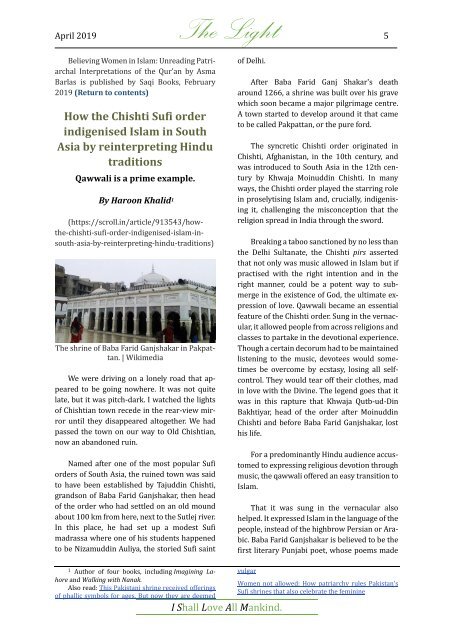The Light April 2019 04
Monthly magazine of the Ahmadiyya Association for the Propagation of Islam. Propagating Islam as taught by the Holy Prophet Muhammad (s) - peaceful, loving, inclusive and rational which teaches respect for the followers and founders of all religions.
Monthly magazine of the Ahmadiyya Association for the Propagation of Islam. Propagating Islam as taught by the Holy Prophet Muhammad (s) - peaceful, loving, inclusive and rational which teaches respect for the followers and founders of all religions.
Create successful ePaper yourself
Turn your PDF publications into a flip-book with our unique Google optimized e-Paper software.
<strong>April</strong> <strong>2019</strong> <strong>The</strong><br />
<strong>Light</strong> 5<br />
Believing Women in Islam: Unreading Patriarchal<br />
Interpretations of the Qur’an by Asma<br />
Barlas is published by Saqi Books, February<br />
<strong>2019</strong> (Return to contents)<br />
How the Chishti Sufi order<br />
indigenised Islam in South<br />
Asia by reinterpreting Hindu<br />
traditions<br />
Qawwali is a prime example.<br />
By Haroon Khalid 1<br />
(https://scroll.in/article/913543/howthe-chishti-sufi-order-indigenised-islam-insouth-asia-by-reinterpreting-hindu-traditions)<br />
<strong>The</strong> shrine of Baba Farid Ganjshakar in Pakpattan.<br />
| Wikimedia<br />
We were driving on a lonely road that appeared<br />
to be going nowhere. It was not quite<br />
late, but it was pitch-dark. I watched the lights<br />
of Chishtian town recede in the rear-view mirror<br />
until they disappeared altogether. We had<br />
passed the town on our way to Old Chishtian,<br />
now an abandoned ruin.<br />
Named after one of the most popular Sufi<br />
orders of South Asia, the ruined town was said<br />
to have been established by Tajuddin Chishti,<br />
grandson of Baba Farid Ganjshakar, then head<br />
of the order who had settled on an old mound<br />
about 100 km from here, next to the Sutlej river.<br />
In this place, he had set up a modest Sufi<br />
madrassa where one of his students happened<br />
to be Nizamuddin Auliya, the storied Sufi saint<br />
of Delhi.<br />
After Baba Farid Ganj Shakar's death<br />
around 1266, a shrine was built over his grave<br />
which soon became a major pilgrimage centre.<br />
A town started to develop around it that came<br />
to be called Pakpattan, or the pure ford.<br />
<strong>The</strong> syncretic Chishti order originated in<br />
Chishti, Afghanistan, in the 10th century, and<br />
was introduced to South Asia in the 12th century<br />
by Khwaja Moinuddin Chishti. In many<br />
ways, the Chishti order played the starring role<br />
in proselytising Islam and, crucially, indigenising<br />
it, challenging the misconception that the<br />
religion spread in India through the sword.<br />
Breaking a taboo sanctioned by no less than<br />
the Delhi Sultanate, the Chishti pirs asserted<br />
that not only was music allowed in Islam but if<br />
practised with the right intention and in the<br />
right manner, could be a potent way to submerge<br />
in the existence of God, the ultimate expression<br />
of love. Qawwali became an essential<br />
feature of the Chishti order. Sung in the vernacular,<br />
it allowed people from across religions and<br />
classes to partake in the devotional experience.<br />
Though a certain decorum had to be maintained<br />
listening to the music, devotees would sometimes<br />
be overcome by ecstasy, losing all selfcontrol.<br />
<strong>The</strong>y would tear off their clothes, mad<br />
in love with the Divine. <strong>The</strong> legend goes that it<br />
was in this rapture that Khwaja Qutb-ud-Din<br />
Bakhtiyar, head of the order after Moinuddin<br />
Chishti and before Baba Farid Ganjshakar, lost<br />
his life.<br />
For a predominantly Hindu audience accustomed<br />
to expressing religious devotion through<br />
music, the qawwali offered an easy transition to<br />
Islam.<br />
That it was sung in the vernacular also<br />
helped. It expressed Islam in the language of the<br />
people, instead of the highbrow Persian or Arabic.<br />
Baba Farid Ganjshakar is believed to be the<br />
first literary Punjabi poet, whose poems made<br />
1 Author of four books, including Imagining Lahore<br />
and Walking with Nanak.<br />
Also read: This Pakistani shrine received offerings<br />
of phallic symbols for ages. But now they are deemed<br />
vulgar<br />
I Shall Love All Mankind.<br />
Women not allowed: How patriarchy rules Pakistan’s<br />
Sufi shrines that also celebrate the feminine














